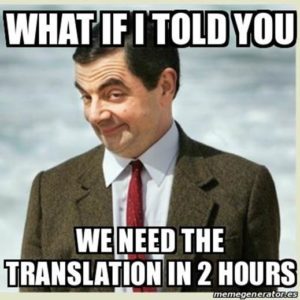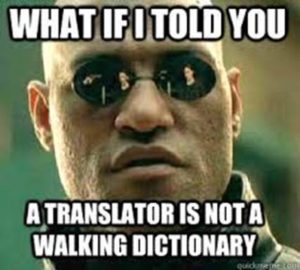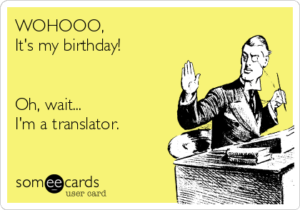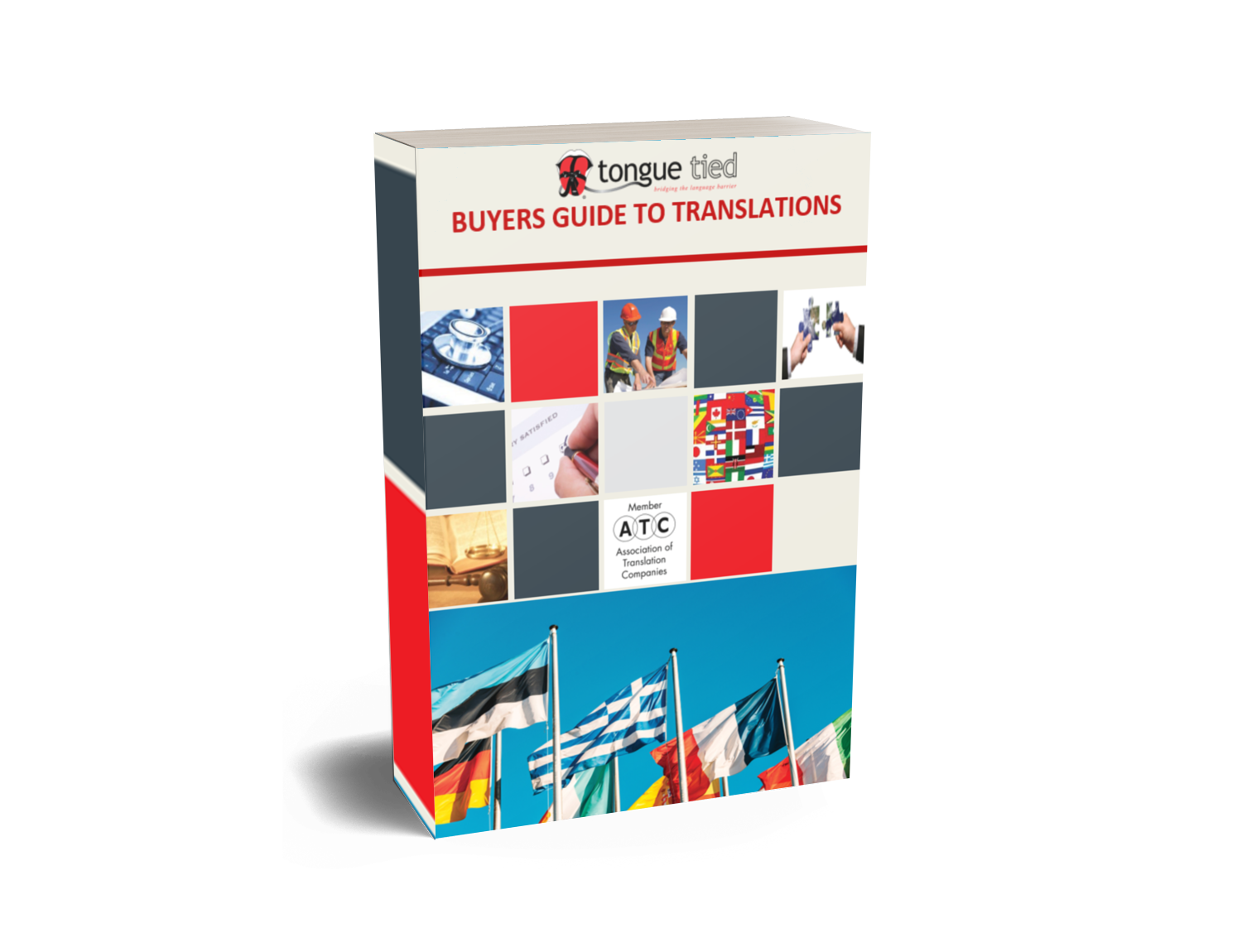How can you help your translator?

Here at Tongue Tied we like to deliver translations that exceed all expectations!
And we also want to make the translation process as smooth as possible for everyone involved.
Although your translator is doing the bulk of the work, there are some things that you can do to help them!
We’ve put together a list of steps from the beginning to the end of the translation process where your input can be crucial to ensure you receive a high-quality translation that’s fit for purpose!
Take a look at the points below and bear these in mind the next time you request a translation.
Pre-translation
Let’s start at the very beginning – you have a translation requirement and you want to get a price as quickly as possible to get the ball rolling.
Great! We like to get quotes back to clients within an hour or two!
But there are a few things we need first…
- The document that needs translating!
You’d be surprised how many people tell us they have a 10-page report that needs translating and expect us to be able to provide a quote based on that information alone.
We need to see the file itself first for a number of reasons: to get an accurate word count, to check whether we’ll need to involve typesetters if there are images or uneditable text, and to run the file through our software that counts repetitions to give you the best price possible, as we can provide discounts on repeated text!
And when you send the file to us, there are a few things to bear in mind…

It’s best to send the original file. Remember that PDFs can’t be edited. If you only have a PDF, we won’t be able to apply the repeated text discounts because we need a workable file.
If the only choice you have is to send a scan or photo of the document, please do make sure it’s clear – we sometimes receive scans/photos with words cut off or fingers in the way! The translator will need to see all of the text to be able to translate it!
- Clear instructions!
It might sound obvious, but people often forget to specify which language/s they need the document translating into. This is vital information!
And don’t forget to be specific if the language has more than one variety, e.g. European or Brazilian Portuguese!
Let us know if you have a particular deadline in mind. We’ll always include the estimated turnaround time in our quotes, but if you need the translation back by a certain date, let us know!

Based on more than 25 years of translating experience, we know that a translator can translate around 2,000 words per day accurately and to the best of their ability.
If you have a big document that you urgently need translated, tell us and we can look into options like splitting the job between two translators (although this comes with a warning that consistency may be compromised, as each translator will have their own individual style of writing!).
Make sure you also communicate any additional instructions before the translation work gets underway – are there parts of the document that don’t need translating? Do you need the translation to be provided in a certain column in your Excel file? Do you need the translator to leave any words in English or highlight any key words?
Providing these instructions at the start of the project is very important. You don’t want the translator to have made a start on translating the entire document only to find out that the first three paragraphs weren’t needed!
- Reference material
At the start of any project, we will always ask our clients, both new and existing, if they have any reference material that will help the translator.
This might be a link to a website, a previous translation in the relevant language, a glossary or a terminology guide.
If you’re having instructions for a product translated, for example, it can help the translator to have access to other information about the product. This can be especially helpful when you have a shorter text that needs translating.
These short texts often have very little context, so the translator might sometimes even be in a position where they don’t know what the product that they’re writing about actually is!
Some businesses have company-specific guidelines for written documents. They may want certain terms to be left in English, for example, or they might consistently translate a word in a certain way.

We place jobs with translators who specialise in the relevant subject area. If you have a legal document that needs translating, for example, we will place this with a legal translator.
A legal translator will be familiar with legal terminology, but ultimately, they are an external party and will not have the same inside knowledge that your company has.
If your business has an existing glossary or any other language resources in place, please do share them with us.
During Translation
The quote has been confirmed and you’re happy for us to make a start on the work – great!
If you’ve provided everything listed above, you’ll have done all you can to make the actual translation process a smooth and easy ride!
But remember, it’s important for you to still be available and in contact while the translator is doing their work for a couple of reasons!
- Feedback
If we’re translating a lengthy document for a new client, we like to send over a sample of the translation (around 500 words) to make sure they are happy with the style, tone and terminology the translator is using.
This step will only apply if you have someone who speaks the target language within your company.
As they will have inside knowledge of your industry, they can let us know if there is anything the translator should be doing differently. Maybe they’d prefer the translator to use a different word for a particular term, for example.
It’s good to get this sorted at the beginning of the project, which is why we think providing a small sample of text can be extremely useful!
- Questions
Although reference materials and terminology lists will help to answer the majority of questions the translator may have, it might be the case that some queries do crop up when they’re doing the work.

Maybe there is an ambiguity in the source text that needs clarifying.
Perhaps they’ve spotted a mistake in the source text that needs to be corrected.
Or maybe they just need you to provide a bit more information about a certain aspect of the text.
We believe that good translators ask questions. We encourage our translators to ask questions.
It’s important that you’re available to answer any questions the translator may have and that you respond as quickly and clearly as you can.
A crucial question might need answering before the translator can continue with their work. It’s important that nothing holds up the process!
If you’re not going to be available, just let us know which colleague of yours will be able to help!
- Any changes?
If any changes are made to the document you’ve asked us to translate, let us know as soon as possible.
If you have any additional text that needs translating, send it over as soon as you can.
It’s best for the translator to be aware of any changes sooner rather than later.
If they’re already halfway through the translation and you tell us that you’ve cut out a big chunk of text that no longer needs translating, the translator will still need to be paid for the work that they’ve done.
It’s therefore beneficial for both you and the translator that any changes are communicated as quickly and clearly as possible!
Post-translation
After we’ve delivered your translation on time, the ball is in your court!
It’s lovely for our translators to receive positive feedback and we always pass this on when we receive it!
We also work hard to resolve any issues you might have with the translation as quickly as possible.
- Feedback and comments
We’re pretty certain that you’ll be happy with the end result once you’ve received your translation, but if you or your reviewer have any feedback or comments to share, it’s helpful to receive these as soon as possible while the job is still fresh in everyone’s minds!
If you have any formatting changes that you’d like our typesetters to make, for example, send these over as soon as you can, and we’ll get them sorted for you straight away!
We’re happy to make any amendments to the translation free of charge within 30 days of delivery.
It’s important that any comments on the translation are clear and precise.
If you’re not happy with the translation, we need to receive specific examples of corrections, so that we can discuss these with the translator.
Of course, if you provided reference materials, a glossary, etc. at the start, it’s unlikely that there will be any differences of opinion in how key words and phrases have been translated.
But ultimately, two native speakers of the same language can have different preferences, so it may be the case that your reviewer would like some words changed.
This doesn’t mean that what the translator has written is incorrect or that your reviewer is incorrect either! It’s simply a case of preference and sometimes inside knowledge that the reviewer has, and the translator does not.
Our translators are all highly qualified and experienced professionals working into their native language, but without a glossary or terminology list, they will only be able to translate as they see fit.
That’s why the steps at the beginning of the process are so crucial!
- Future translations
Maybe you know that there will be more documents that are linked to this project that will need translating in the future.
It’s definitely worth letting us know in advance, as we can inform the translator.
We like to use the same translator for each client, provided they are suitable for the subject matter in question.
This means that over time they become familiar with your company’s terminology and preferred style and tone of writing.

If you have any queries about future translations or you want us to check your usual translator will be available for work in the coming weeks, now is a good time to ask!
We hope you’ve found this list of points useful!
We think it’s important that clients are aware that they also play a crucial role in the translation process.
If you have any questions about any of the above or if you think we’ve missed any key points, please do let me know!
And if you need a quote for a translation, please do get in touch with us at sales@ttmltd.com!


0 Comments